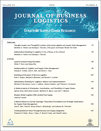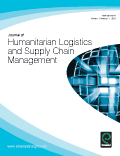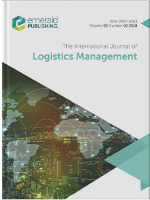
Journal of Business Logistics
Scope & Guideline
Advancing logistics knowledge for a dynamic world.
Introduction
Aims and Scopes
- Supply Chain Management and Strategy:
The journal emphasizes the integration of supply chain management strategies, exploring how firms can align their operations with market demands and competitive dynamics. - Logistics Operations and Performance:
Research in this area focuses on optimizing logistics operations, including transportation, warehousing, and distribution, to improve overall supply chain performance. - Technology and Innovation in Logistics:
The journal encourages studies on the impact of emerging technologies such as artificial intelligence, blockchain, and Industry 4.0 on logistics practices and supply chain transformation. - Sustainability and Ethical Practices:
A core area of focus is on sustainable supply chain management practices, addressing environmental and social impacts, and promoting ethical behavior among supply chain stakeholders. - Human Factors and Workforce Dynamics:
The research recognizes the importance of human elements in logistics, examining employee dynamics, job satisfaction, and leadership challenges within supply chains. - Global Supply Chain Integration:
The journal explores the complexities of global supply chains, including trade dynamics, cross-border logistics, and the implications of global disruptions.
Trending and Emerging
- Last-Mile Delivery Innovations:
Recent studies emphasize the critical importance of last-mile delivery solutions, driven by e-commerce growth and customer expectations for rapid fulfillment. - Sustainability and Resilience Strategies:
Research focusing on developing sustainable and resilient supply chains has gained momentum, particularly in response to global disruptions such as the COVID-19 pandemic. - Digital Transformation and Industry 4.0:
There is a growing interest in how digital technologies, including AI and blockchain, transform logistics and supply chain management, enhancing efficiency and transparency. - Behavioral Insights in Supply Chain Decisions:
Emerging studies explore the psychological and behavioral factors influencing supply chain decisions, highlighting the role of human behavior in operational success. - Agility and Flexibility in Supply Chains:
The need for agile and flexible supply chain structures is increasingly recognized, allowing organizations to adapt quickly to market changes and unforeseen challenges.
Declining or Waning
- Traditional Inventory Management:
Research on conventional inventory management techniques appears to be decreasing, as newer methodologies and technologies take precedence in optimizing inventory control. - Cost-Cutting Strategies in Logistics:
The focus on merely reducing logistics costs without considering broader strategic implications is less prevalent, as organizations seek comprehensive value creation over cost minimization. - Static Supply Chain Models:
There is a noticeable reduction in studies utilizing static models for supply chain analysis, as the field increasingly embraces dynamic and adaptable frameworks that better reflect real-world complexities. - Single-Factor Performance Metrics:
An emphasis on singular performance metrics, such as cost or speed, is waning, with a growing focus on multidimensional performance assessments that consider sustainability, resilience, and customer satisfaction. - Traditional Risk Management Approaches:
Research centered on conventional risk management frameworks is declining, as the field evolves towards more integrated and proactive risk management strategies that account for supply chain interdependencies.
Similar Journals

Journal of Global Operations and Strategic Sourcing
Advancing Knowledge in Global Operations and Strategy.Journal of Global Operations and Strategic Sourcing, published by Emerald Group Publishing Ltd in the United Kingdom, is a leading platform for disseminating high-quality research in the fields of Management Science, Operations Research, Organizational Behavior, as well as Strategy and Management. With an impressive quartile ranking of Q2 in various categories and a remarkable position in the Scopus database—with ranks in the top percentiles of their respective disciplines—this journal serves as a crucial resource for scholars, practitioners, and students alike. The journal's scope encompasses the latest trends and methodologies in global operations and strategic sourcing, fostering innovative discussions and practical applications that are essential in today's dynamic business environment. By bridging the gap between theory and practice, the journal invites a diverse range of contributions, reinforcing its status as an influential voice in academia and industry. Additionally, although not openly accessible, the journal is committed to providing readers with valuable insights that enhance both academic and professional practices in a rapidly evolving global landscape.

Supply Chain Forum
Advancing supply chain knowledge for a dynamic world.Supply Chain Forum, published by TAYLOR & FRANCIS LTD, is a prominent peer-reviewed journal that has gained significant recognition in the field of supply chain management and operations research. With an impressive Q1 ranking in both Business and International Management and Management Science and Operations Research, along with a Q2 ranking in Management of Technology and Innovation, the journal stands as a vital resource for researchers, professionals, and students alike. The journal, identified by ISSN 1625-8312 and E-ISSN 1624-6039, showcases high-quality research through its commitment to exploring contemporary issues in supply chain dynamics and innovative management practices. Its influence is evident as it ranks in the 84th percentile for Business and International Management and Management Science and Operations Research, making it an authoritative source for cutting-edge developments in the field. Readers can expect to engage with a diverse range of topics aimed at advancing knowledge and practice in supply chain systems. The journal is accessible from the United Kingdom and is dedicated to fostering scholarly dialogue that bridges theory and practice in supply chain management.

TRANSPORTATION JOURNAL
Advancing the Future of Transportation ResearchTRANSPORTATION JOURNAL, ISSN 0041-1612 and E-ISSN 2157-328X, is a premier publication in the field of transportation, published by Wiley. Situated in the United States, this journal aims to disseminate cutting-edge research and innovative practices related to various aspects of transportation systems, policy, and logistics. As of 2023, it is positioned in the third quartile (Q3) of the Transportation category, with a Scopus rank of #84 out of 141, placing it in the 40th percentile among its peers. With a history spanning from 1996 to 2024, the *TRANSPORTATION JOURNAL* showcases original research, reviews, and case studies that contribute to the understanding and enhancement of transportation systems. While not an Open Access journal, it provides significant value to its audience of researchers, professionals, and students by fostering discourse on critical issues and innovations in transportation. The journal serves as an essential resource, helping to bridge the gap between theory and practice in this vital field.

NAVAL RESEARCH LOGISTICS
Unveiling Insights for Tomorrow's Maritime ChallengesNAVAL RESEARCH LOGISTICS is a prestigious scholarly journal, published by WILEY, that serves as a vital platform for researchers and professionals in the fields of management science, operations research, ocean engineering, mathematics, and modeling and simulation. With an impressive impact factor and recognized as a Q1 journal in its respective categories, it reflects the highest standards of quality and rigor in research dissemination. Covering discussions from its inception in 1973 to the present, NAVAL RESEARCH LOGISTICS addresses key issues and innovations in logistics and operational challenges, particularly within the naval context, thus making significant contributions to policy and strategic decision-making. The journal is not currently available as an open-access publication, yet it provides rich insights essential for academics, industry experts, and students keen on advancing their knowledge in logistics and operations related to maritime applications. With a commitment to bridging theory and practice, this journal is an indispensable resource for anyone connected to the maritime logistics field.

Production Engineering Archives
Unlocking Knowledge in Manufacturing ExcellenceProduction Engineering Archives, published by WALTER DE GRUYTER GMBH, stands as a premier open access journal dedicated to the fields of industrial and manufacturing engineering, management information systems, and the management of technology and innovation. Since its inception in 2013, this journal has committed itself to disseminating high-quality research that drives forward the discourse in these crucial areas. With a commendable impact reflected in its 2023 Category Quartiles, which place it in Q2 for multiple categories including Industrial and Manufacturing Engineering and Management Information Systems, the journal holds esteemed ranks in the Scopus index, highlighting its significance in the academic community. By facilitating unrestricted access to cutting-edge research from Poland and beyond, the Production Engineering Archives plays a pivotal role in enhancing knowledge and fostering innovation among researchers, professionals, and students alike.

Logistics-Basel
Connecting Ideas in Logistics and Operations ManagementLogistics-Basel, an esteemed academic journal published by MDPI, is a pivotal platform dedicated to advancing knowledge in the fields of logistics, supply chain management, and transportation. As a fully Open Access journal since 2017, it promotes the free dissemination of research findings, ensuring that crucial insights are accessible to a global audience. With its headquarters in Switzerland, the journal operates in a competitive landscape and has achieved significant recognition, evidenced by its Q2 ranking across multiple categories in the 2023 metrics, including Information Systems and Management, Management Science and Operations Research, and Transportation. The journal has been consistently contributing to its field since its inception, and its inclusion in esteemed databases like Scopus further highlights its relevance and impact. With an emphasis on fostering interdisciplinary research, Logistics-Basel serves as a vital resource for researchers, practitioners, and students alike, providing a forum for innovative studies that address contemporary challenges in logistics and operations.

Central European Journal of Operations Research
Connecting Scholars and Practitioners in Operations ScienceCentral European Journal of Operations Research is a prestigious academic journal published by Springer that focuses on the dynamic field of operations research and management science. With an ISSN of 1435-246X and an E-ISSN of 1613-9178, this journal serves as a crucial platform for researchers and practitioners to disseminate their innovative findings and approaches in operational methodologies. The journal, located in Germany, is recognized for its rigorous peer-review process and has established itself as a significant contributor in the field, reflected by its Q3 ranking in the 2023 Management Science and Operations Research category. The journal has consistently published high-quality research since its inception in 2006 and aims to bridge the gap between academic research and practical application in today’s complex operational landscape. With a Scopus rank of #78 out of 207 in the Decision Sciences category, positioned in the 62nd percentile, it underscores the journal's important role in advancing knowledge and sharing insights among its international readership. For those looking to deepen their understanding of operations research and its applications, the Central European Journal of Operations Research stands out as an indispensable resource.

Journal of Humanitarian Logistics and Supply Chain Management
Advancing knowledge for impactful humanitarian logistics.Journal of Humanitarian Logistics and Supply Chain Management is a premier academic journal published by Emerald Group Publishing Ltd that addresses the critical intersection of logistics and supply chain management within humanitarian contexts. With an ISSN of 2042-6747 and an E-ISSN of 2042-6755, this journal has established itself as a leading resource for researchers, professionals, and students dedicated to enhancing operational efficiency and effectiveness in disaster relief and humanitarian aid. The journal enjoys a distinguished standing with a Q1 ranking in Management Information Systems and a Q2 ranking in Management Science and Operations Research, reflecting its contributions to the field and its significant impact factor, placing it in the 75th percentile among its peers in Scopus rankings. Covering a spectrum of topics from innovative supply chain strategies to responsive logistics frameworks, the Journal of Humanitarian Logistics and Supply Chain Management provides valuable insights and practical solutions that are essential for enhancing resilience and responsiveness in humanitarian operations as it converges through the years from 2011 to 2024. Researchers and industry practitioners alike are encouraged to engage with its robust articles, fostering collaboration and knowledge exchange to meet the evolving challenges faced in humanitarian logistics.

Asia Pacific Journal of Marketing and Logistics
Connecting Academia with Real-World Logistics Solutions.Asia Pacific Journal of Marketing and Logistics is a premier publication dedicated to advancing research in the fields of marketing and logistics within the dynamic Asia Pacific region. Published by EMERALD GROUP PUBLISHING LTD in the United Kingdom, this esteemed journal boasts impressive rankings, holding a Q1 classification in Business and International Management and Q2 classifications in both Marketing and Strategy and Management as of 2023. With its rich history from 1993 to 2024, the journal has established itself as a critical platform for scholars and practitioners, providing insights that drive innovative practices and strategies. Although it does not currently offer open access options, it remains essential reading for anyone involved in these fields, evidenced by its strong Scopus rankings and high percentiles in various categories. By fostering discussions on contemporary issues and emerging trends, the Asia Pacific Journal of Marketing and Logistics is committed to contributing significantly to the discourse within academia and industry.

International Journal of Logistics Management
Pioneering Insights for Global Transportation SolutionsThe International Journal of Logistics Management, published by Emerald Group Publishing Ltd, stands at the forefront of research in the dynamic fields of logistics, transportation, and supply chain management. With an impressive impact factor reflected in its Q1 ranking in both Business and International Management and Transportation, this journal provides a prestigious platform for scholars and professionals to publish cutting-edge research. Since its inception in 1990, the journal has continuously evolved, reflecting the latest trends and challenges in logistics practices worldwide, with coverage extending until 2024. By facilitating access to high-quality, peer-reviewed articles, the International Journal of Logistics Management empowers researchers and practitioners alike to advance their understanding and implementation of innovative logistics strategies. This journal remains vital for those looking to make significant contributions to the field, offering a comprehensive outlet for original research, case studies, and reviews that shape the future of logistics.